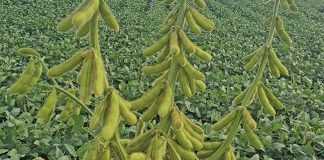“It‘s all about the customer,” stress the Van der Merwes of ALG Estates, who received the national Agricultural Writers 2010 Farmer of the Year Award.Citrusdal is the epicenter of the Western Cape’s citrus industry. All and Gerrit van Der Merwe and their brother Lieben (who has now bowed out of the business) took over their father’s citrus farms here in 1974 and established ALG Estates.
Gerrit’s son Gerrit Jr has since stepped in, and the team has proved an unstoppable force in the local and international citrus industry. These days they run the only farming enterprise that can supply citrus for 10 months of the year. They produce 25 commercial varieties of citrus on 600ha of land, and their latest yield totalled 15 800t.
Adapting to the free market
“We started the business in 1974,” says Gerrit. “At this time South African agriculture and agricultural markets were still highly regulated and farmers had little option but to just farm. We had no part in marketing our own produce. But when the sector became deregulated in the 1990s, I travelled to Europe to get an idea of how other farmers market their produce.” He realised that South African farmers took the wrong approach.
They planted according to production demands, looking for varieties that would be easy to produce and give high yields, instead of planting according to market and consumer demands. “I realised we wouldn’t make it in the free market if we didn’t change the way we were farming,” he recalls. “We started to align our production to market demand.”
Growth, innovation and diversification
“When we started investing in more than just primary agriculture, the business really took off,” says Gerrit. “Our fruit carried the smallest value in the value chain. By adding value – by packaging, processing, marketing and distributing our product – we increased the profitability of our farming business.
It was all about getting as close to our consumer as possible.”In 1993 the Van der Merwes erected their own packhouse and in 1995 they built South Africa’s first on-farm fruit colouring chamber, where they could get fruit ready to be supplied to supermarkets sooner.
They erected their own processing plant where excess fruit is processed into high-quality fresh and concentrated juice, as well as citrus oil. The plant can handle at least of 20 000t annually. Then they introduced cattle and sheep and fed them on, amongst others, the peels from the juice factory. More recently ALG Estates started its own semi-organic fertiliser plant to help reduce fertiliser costs.
A wider citrus range
“We’ve diversified our citrus basket to ensure our customers a continuous supply of stock for the longest period possible throughout the year. We also introduced varieties that cater for differing consumer demands,” Gerrit explains. “Consumers want sweet, seedless fruit, easy peelers and other soft citrus, as well as fruit with red flesh.
All recalls, “When I started farming with my father we had Navels, Valencias, lemons and naartjies and that was it. Now our commercial varieties include five different navel cultivars, nine soft citrus cultivars, three Valencia cultivars, lemons and grapefruit.”Using early- and late-ripening varieties, they supply customers 10 months of the year.
“This is a late-producing area and we’re always looking for new late varieties, such as late mandarins or summer navels,” says All. In one orchard they’ve established the late seedless Valencia (patented as the Swartvlei Late Valencia), which ripens about a month later than the rest of the crop. The brothers believe that if they can cultivate it fully within the next five years, they can supply fresh citrus for 12 months of the year.
Adapting production practices
“We adapt our production practices to comply with strict export regulations of our overseas clients,” says All.
“As food safety standards become an increasing issue, we had to move away from harsh chemicals and now use as many alternative pest-control methods as possible. We also did this because we wanted to farm in a more biologically sound and environmentally sustainable way.”
According to ALG Estates production manager Kenny Beaton, they have a skeleton spraying programme for pests, but choose to work according to a monitoring system. Because of the area’s Mediterranean climate, with very hot summers and cold wet winters, they don’t have too many problems with diseases. “One of the main pests is false coddling moth, for which we use no chemical control. Instead we use an integrated pest management system,” says Kenny.
Some of the methods include the sterile insect technique (SIT). Insects are sterilised through radiation and released in lands. Their matings with “wild” insects produce no offspring. ALG enterprises also use mating disruptions including synthesised sex pheromones to disrupt the insects’ reproductive cycle.“During the harvest season, workers pick up fruit that have fallen on the ground twice a week,” says Kenny. “Rotting fruit in the orchard attracts pests like codling moth.”
All says, “When we first started moving away from the harsher chemical, the insect load seemed to increase, but with time it became easier and we saw natural predators returning.”Pruning citrus orchards is a relatively new production concept, especially to South African producers, but the Van der Merwes started in the early 1990s. “Pruning citrus trees is all about managing sunlight distribution in the orchards,” says All.
“We do mechanical pruning, assisted by hand pruning. The trees are pruned at a height of 3m. “Since we started pruning we’ve increased the planting density to up to 1 000/ha trees, increasing yield per hectare. Smaller trees are easier to harvest, picking is faster and labour costs are lower.”“We use micro-irrigation to protect the citrus trees from the summer heat, and employ strict control over water consumption with a computerised irrigation system.”
They are now investigating the introduction of DFM groundwater probes for more precise management of water in the soil.
Future challenges
ALG Estates’ citrus products are exported to supermarkets in Britain, Western and Eastern Europe, the Middle East, Russia and the US. About 70% of the total citrus crop is exported, while the rest is sold locally and distributed to African countries such as Angola Tanzania, Uganda and Zambia. “We are very excited about new export opportunities to African countries and we anticipate good opportunities in the local market as well,” says Gerrit.
However, their main focuses are the US and the EU, which together account for more than 50% of their total exports.
“We expect the rand to hold strong against currencies such as the euro and the US dollar, so our biggest challenge in the near future will be the exchange rate,” says Gerrit. Gerrit Jr adds, “About 20% to 30% of our profit depends on how we can manage the exchange rate’s impact on our business.
Unfortunately we cannot do anything about the rate itself, but by consultation and carefully monitoring certain market indicators such as the repo rate, we can to some extent control that impact.”The Van der Merwes agree that controlling what they can, producing a quality product according to consumer demand, marketing it and managing it as far down the value and supply chain as possible – is the bottom line.













